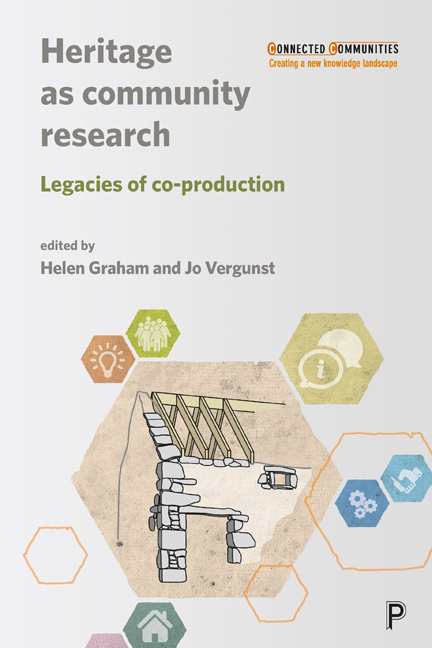Conclusion: Co-producing futures – directions for community heritage as research
Published online by Cambridge University Press: 27 April 2022
Summary
Introduction
If, as we said in our Introduction to this book, the past is not what it used to be, then the future of the past – the future of heritage – is not either. Where we might once have envisaged more and more centralised control over heritage and the increasing professionalisation of what has, in many respects, become an industry, this no longer appears as the only, or even the most significant, way in which heritage will be in the future. Altogether different kinds of conversation are happening. These are shown by the approaches taken by the contributors to this book, which demonstrate the importance of shared inquiry and dialogue to what we have emphasised as the process of heritage. This is fundamentally what we mean by heritage as community research.
It is no coincidence that the projects explored here have come into being now in a way that can be viewed and are visible as they are in this volume. The new wave of participative research and participative heritage is coming at a time when institutions are renegotiating their relationships with wider society, prompted by the refiguring of the state since the late 20th century. Features of this change include declining deference to professionals, restructuring economies and flows of public money that require new business models for universities and heritage organisations, and increased cynicism towards government, including local government. At the same time, through the Internet and social media, notions of self-expression and the right to participate have become visceral, lived and expected, while recognising that the reliance of these forms on the exploitation of harvested personal data render this ambivalent to say the least.
In these contexts, radical traditions of the 1960s and 1970s have renewed relevance and resonance, and have come together with public funding initiatives, not least the Arts and Humanities Research Council's (AHRC’s) Connected Communities programme and the Heritage Lottery Fund's (HLF’s) commitment to community-led heritage as part of a reorientation of universities, museums, other cultural institutions and local government. It is easy to be sceptical of this confluence and it is by no means ‘pure’, but then no political situation ever is.
- Type
- Chapter
- Information
- Heritage as Community ResearchLegacies of Co-production, pp. 209 - 214Publisher: Bristol University PressPrint publication year: 2019



